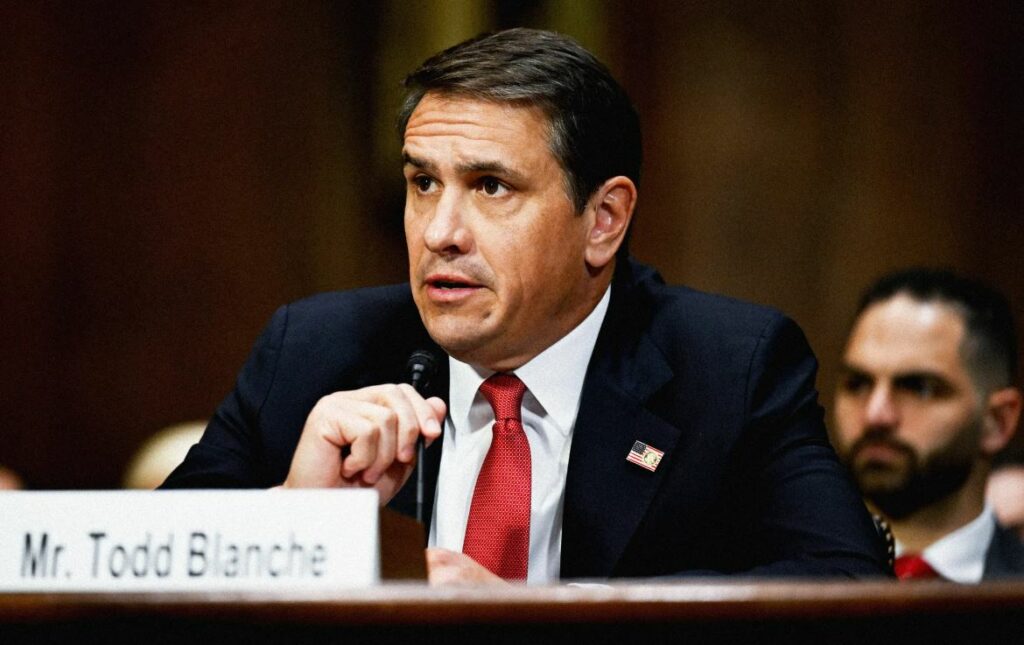
The U.S. is quietly changing its approach to crypto regulation. Since former President Donald Trump returned to office, key government agencies have taken a big step back from enforcing rules in the crypto industry. This shift is raising concerns about the future of crypto laws and who, if anyone, is responsible for keeping the space in check, especially in the face of rising crypto crimes.

A Shift Away from Enforcement
On April 7, Deputy Attorney General Todd Blanche sent a letter to all Department of Justice (DOJ) staff. In it, he said the DOJ would “deprioritize” certain criminal prosecutions involving crypto companies. These include cases where firms failed to prevent money laundering or didn’t register properly as money transmitters.
As part of this shift, the DOJ will shut down its National Cryptocurrency Enforcement Team (NCET). This special unit had focused on investigating crypto crimes linked to cryptocurrency. According to the letter, the DOJ no longer plans to go after crypto exchanges, mixing services, and offline wallets for violations by their users or for accidental regulatory breaches.
The letter criticized the Biden-era policy of “regulation by prosecution,” calling it reckless and poorly planned. Now, the DOJ says it will only focus on serious offenses involving crypto, such as terrorism, drug trafficking, hacking, and other high-impact crypto crimes.
Trump’s Ties to Crypto
Trump has long shown support for crypto, especially Bitcoin. During his previous campaign, he presented himself as a pro-Bitcoin candidate. His family has also embraced the crypto world.
In late March 2025, President Trump pardoned the co-founders of BitMEX, a crypto exchange. They had pleaded guilty in 2022 to failing to run a proper anti-money-laundering program. Before that, Trump also pardoned Ross Ulbricht, the creator of the Silk Road darknet marketplace. These moves were seen as major wins for the crypto community.
Around the same time, Chinese entrepreneur Justin Sun announced a $75 million investment in World Liberty Financial, a crypto company linked to the Trump family. Just a month later, the SEC paused its fraud case against Sun and his companies. A court update on the case is expected this spring.
The Trump family’s involvement in crypto goes beyond policy. Donald Trump Jr. and Eric Trump launched a Bitcoin mining venture in late March. Before that, Trump Media & Technology Group—owner of Truth Social—announced plans to offer crypto exchange-traded funds (ETFs). President Trump himself has issued NFTs and launched a memecoin with his wife, Melania.
These personal and family ventures are growing while the federal government is pulling back from enforcement, raising concerns about unchecked crypto crimes.
SEC Retreat Mirrors DOJ Strategy
The DOJ’s move follows a similar trend at the Securities and Exchange Commission (SEC). Under former President Biden, the SEC was tough on crypto. But in recent months, it has quietly dropped several cases against big crypto companies.
A former SEC employee told WIRED in February, “The dismantling of the SEC enforcement program is mammoth.” The agency is also stepping back from overseeing memecoins, crypto tokens often used for speculation. These coins are popular but risky for investors and often involved in crypto crimes.
Just before the latest presidential inauguration, Trump and Melania introduced their own memecoins. This action further connects the administration to the crypto space.
A Legal Vacuum and Rising Concerns
Experts say the rollback of crypto enforcement sends a clear message: Most crypto-related violations won’t be pursued unless they involve serious crimes. Christopher LaVigne, a former U.S. prosecutor, said the goal is to build a better system that stops fraud, protects users, and allows innovation. But he also warned of risks in this “vacuum.”
Daniel Silva, another former prosecutor, pointed out that while prosecutors aren’t banned from pursuing crypto crimes, the DOJ’s new priorities make it less likely they will. “If I’m a prosecutor, I’m not sure I’m interested,” he said. Complex crypto cases take years and resources, and could now be rejected by supervisors.
This change might let crypto firms push the limits of the law without fear of immediate consequences. “If you’re a cryptocurrency company right now,” Silva added, “you have a bit more certainty that your risk tolerance might expand.”
A Temporary Pause?
Not everyone is convinced this change will last. Joshua Naftalis, a partner at Pallas Partners and former prosecutor, said the DOJ’s softer stance might only offer temporary relief. “There’s a statute of limitations,” he noted. A new president could reopen investigations into crypto crimes committed today.
Despite the relaxed attitude, Naftalis stressed that the crypto industry still has to obey the law. “You can’t just commit flagrant financial crimes and expect no one to look at it,” Silva added.
The question now is not whether the law exists—but which laws will be enforced, and by whom.
Senators Push Back
Some lawmakers are alarmed. On April 10, six Democratic senators wrote to the DOJ. Their letter warned that loosening crypto rules could lead to serious consequences. “Drug traffickers, terrorists, fraudsters, and adversaries will exploit this vulnerability on a large scale,” they wrote – highlighting the broader national security risks of unchecked crypto crimes.
For now, the Biden-era era of aggressive crypto policing seems over. But the situation could change again by July 2025. That’s when a newly formed federal “working group on digital assets” is expected to propose new strategies for regulating the crypto space.
What Comes Next?
Until new rules are introduced, crypto businesses may enjoy a period of freedom. Some will see this as a chance to innovate. Others may try to stretch the boundaries of the law. However, the lack of enforcement doesn’t mean there are no consequences; they may come later.
With Trump’s administration backing away from strict crypto oversight and his family deepening their involvement in the industry, the U.S. enters a murky era of crypto regulation. Whether this path leads to more innovation or more crypto crimes remains to be seen.























